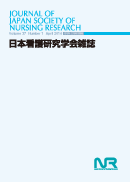All issues

Volume 20 (1997)
- Issue 5 Pages 5_11-
- Issue 4 Pages 4_9-
- Issue 3 Pages 3_72-
- Issue 2 Pages 2_7-
- Issue 1 Pages 1_49-
Volume 20, Issue 5
Displaying 1-2 of 2 articles from this issue
- |<
- <
- 1
- >
- >|
-
Akemi Terasaki, Yuki Mase, Izumi Kohara1997Volume 20Issue 5 Pages 5_11-5_20
Published: December 01, 1997
Released on J-STAGE: March 31, 2016
JOURNAL FREE ACCESSFactor that complicate or aid substitute voice acquisition in older laryngectomee were investigated. 170 patients from a group of patients who underwent laryngectomy during the last three years in Tokyo served as subjects. The following items were analyzed: age, type of surgery, therapy (outpatient), participation in esophageal speech class, substitute voice acquisition, general health, restricted daily living activity, assistance from patients group, and self-esteem.
Approximately 30% of the patients acquired a substitute voice and were able to use it in their social life, and more than 60% of patients over 70 years-old quit attending classes. These patients experienced difficulty in communicating with their family members. Furthermore, the health of patients over 65 years-old who quit attending classes was poor. The sense of restricted daily living activity was especially high for quit attending classes due to factors such as, limited range of movement and stress from eating. It was thought that these are the factors that determine whether or not older patients attend voice classes.
Results of the present study suggest that it would be necessary to provide a voice rehabilitation program that is based on assessment by a medical team soon after surgery to minimize risks for each patients, and to establish an assistance system in which both medical professionals and patients group work together.View full abstractDownload PDF (1114K) -
Kaoru Fujisaki1997Volume 20Issue 5 Pages 5_21-5_33
Published: December 01, 1997
Released on J-STAGE: March 31, 2016
JOURNAL FREE ACCESSThe original purpose of this study was to categorize nursing issues, identified by nurses in charts of 107 clients who had been diagnosed as having an eating disorder in a university hospital in Japan.
As the study progressed, the writer found that a significant gap between nursing issues identified by nurses in the practice setting compared to nursing issues identified in the literature.
Nurses in the practice setting identified more health care provider centered issues rather than client centered issues. There were few inferences to clients self-concept that have been identified as important issues in the literature, such as body-image and self-esteem.
The results of this study points to the need for nurses to understand the underlying issues facing clients with eating disorders so that they can effectively assist clients in dealing with their illness.View full abstractDownload PDF (1044K)
- |<
- <
- 1
- >
- >|